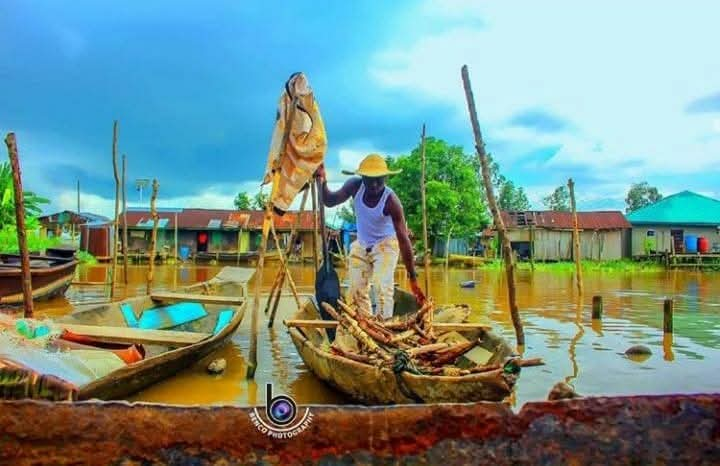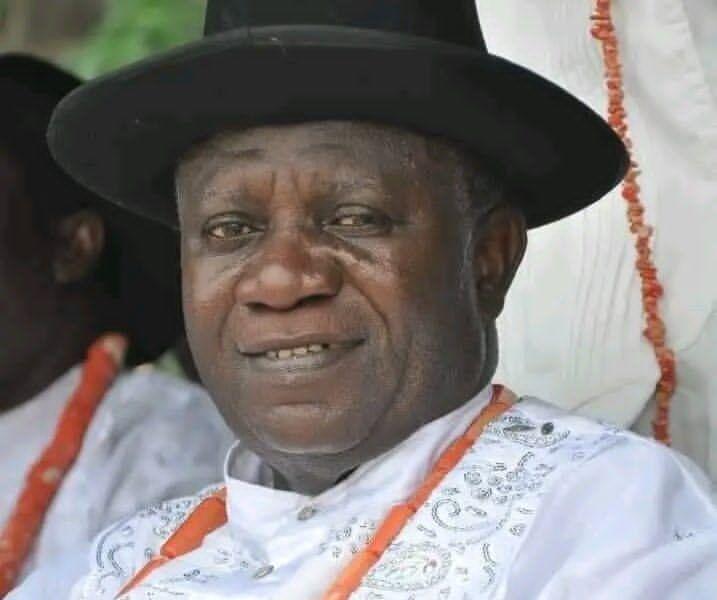THE FISHERMAN By Abai Francis

In the not too distant past, in a creek village known as Zoba, there lived a young fisherman by the name of Tolu. Growing up from childhood to adulthood, all he knew was how to fish. It was through the occupation of fishing that his forefathers and father had survived. His father had taught him all he needed to know about the occupation. He also had plans to pass down the knowledge to his children and he hoped they too will do same to their descendants. At his father's passing, all he had inherited from him were his fishing equipment that consists of fishing nets and a few boats.
But the times were fast changing. Tolu had come to realise that things were not the way they use to be. In fact, things have gotten so bad that instead of the people of Zoba supplying fresh fish to the nearest city as was the old custom, they were now the ones being supplied frozen fish by those living in the city. Most times when he went on his fishing expedition, he rarely came back home with a handful of catch. And as his days got nearer to the setting of the sun, the more he became very worried. Not because he had three children to feed, but because Zoba was gradually losing its natural occupation.
He had carried out series of sacrifices to appease the god of water but all to no avail. After trying a couple of times, he finally gave up. To him, the god of water might have migrated far away to another territory from this side of the river that has become polluted by the blackish substance the people refer to as 'Black Gold'. Since the discovery of this substance, he concluded that the people of Zoba have all lost their senses as they have all forgot what made Zoba popular in the first place.
Perturbed by this sad change of event, he sought for an audience with the people and the king of Zoba in his majestic palace. A town crier went to town to summon the people to the palace of his majesty. On the said date and time when everyone took their seats in the venue, Tolu began his address after paying obeisance to his king.
"My Father, I had this land I inherited from my ancestors where I farm to earn a living for myself and for my family. In no time came a neighbour to occupy the land close to my inheritance. This neighbour is an animal breeder. But his animals would stray into my farm to destroy and eat up my crops. I complained to him severally to tame his livestock but all to no avail. Hence I have brought this matter to your majestic stool to help resolve this impasse."
The people, likewise the King of Zoba, were all very furious. The king demanded for the wicked neighbour to come forward to defend himself on why he should not be punished. But no one came forward. And when asked by his majesty if he can identify this neighbour, to his majesty's consternation and those of the people present, Tolu answered, "The said neighbour is the people of Zoba and the stool upon which the King sits upon."
As soon as he said that, there was an uproar in the palace which suddenly became a deafening silence when the Chief Priest of Zoba rose up quickly from his seat in anger and rebuked Tolu for degrading the throne and warned him to be mindful of the words that proceed forth from his mouth, or else, the gods of Zoba will bring epilepsy of his mouth. But Tolu responded, "I'm not a mad man and I'm aware of my words. As for your gods, I don't think you're aware that they have all traveled" to which there erupted laughter from the audience present.
"What nonsense is this?" the Chief Priest charged him but his majesty called him to order and beckoned on Tolu to go on with his speech.
"Your majesty," Tolu continued, "how many of us still go fishing? How many of our children still know how to fish? When was the last time people from the city came here to our markets to buy fish from us? I was born a fisherman but sadly I'm daily losing my place as a fisherman, howbeit my children and grand children.
"My father, as you all know him was a great fisherman. It is on record that he caught the biggest fish ever to which he was bestowed the traditional title of 'Opu-idi of Zoba'. I remember as a youth how our community was a busy place during our market days as no place in this territory could contest with us, as far as fishing is concerned. But today, where are we?
"Actually, you're not the wicked neighbour but you all have joined that neighbour because you refuse to do anything to address the injustice perpetrated by this new neighbour against our people. As far as I'm concerned, you have joined with him to destroy our land and occupation in exchange for money, jobs and contracts that have divided us more than they have united us as a people.
"In fact, despite the jobs they offer, are all of our people engaged? In the days of fishing, the youths and both the young and old men and women were all occupied with fishing as an occupation. But today, how many of us have jobs? From all I can tell many are now idle and jobless!
"As if that is not enough, we don't have nutritious fish to eat anymore. Instead of fresh fish which made us strong, both physically and health wise, we now consume frozen fish which are also very expensive to get. Even meat has become cheaper and so most of us resort to eating meat which makes us weaker as it kills our body before old age arrives.
"This new neighbour brought 'Black Gold' to destabilize our land and our people against the natural order of things. I'm not against this new neighbour from doing what earns him his daily bread, but why must he use his own to destroy my own? If I did that to him, would he tolerate me?
"Even now, as a result of greed, our people have joined him to destroy our inheritance. This is so sad! The heritage left to us by our ancestors is now becoming a taboo to many of us and their descendants, who now regard fishing as a curse or suffer head job.
"While many of the people of Zoba have made plenty money from the 'Black Gold' no one is investing into our traditional occupation of fishing to modernise it by acquiring vessels to venture into the deep where the waters are not too polluted. For me, all I know is fishing. I'm proud to be a fisherman and that I will ever be. No amount of money will take that away from me."
During his speech, the calm was a deafening silence. As soon as he was done speaking, the King of Zoba arose from his throne, and the people also arose in reverence. He stepped into the open court and addressed Tolu.
"Tolu, son of 'Opu-Idi' I greet you. My father had told me that your father was a very intelligent man and I can see that intelligence in you too. I'm amazed that we still have young men who reason the way you do. It means all hope is not yet lost. Most young men these days are either pushing for oil contracts or are looking for means to get the oil themselves, all in a bid to make quick money.
"You're not part of the inner caucus or a member of the traditional council of chiefs and so I spare your ignorance. We are subject to a higher government and they have sent this new neighbour here and we must oblige or else they apply force. However, we have been doing our best to ensure they keep to what the outside worldly people refer to as environmental best practice, but it hasn't been easy.
"You raised some salient points which are very true. Indeed your observations are noted and we will try to correct the ones that are within our powers to correct. From now henceforth, I will set up a committee to draw out some programmes. For example, we will organise fishing festivals annually and draw up a curriculum for teachers in our various schools within our territories, to include compulsorily the teaching of fishing as a form of entrepreneurship programme. Whether the government sanctions it or not, we will endorse it as part of their compulsory study so that our children will not forget or lose the art of fishing. It will also be followed up with practicals too.
"Indeed a lot of things have gone wrong because we allow strangers to dictate to us. But that doesn't mean that we sanction their acts as our hands are not all that free. We are all fishermen like you and that is what the world knows us to be even before crude oil was discovered in our midst, and that is what we will always be known for."
With that, Tolu went back home feeling much relieved. To him, school or no school, he had been teaching his children the art of fishing just as his parents and ancestors had done to their children. He had promised himself that he will not be the first to fail in that practice. And he wished that Zoba would do the same because he loved his people. After all, there is no place like home.
The End
Photo source: Benco Photography
#penglobaldiscourse #mystorydiscourse



